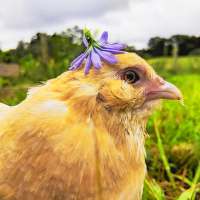Chicken Care 101: Happy, Healthy Chickens

Thinking about adding chickens to your family? In this five-part blog series, we’ll cover the basics to help you decide if bringing chickens into your life is the right choice for both you and the birds. You’ll learn about chicken adoption, safe housing, medical care, proper diet, and the importance of social and emotional care.
In this post, you’ll learn about caring for your chicken’s health needs, including common ailments and expected veterinary costs. Please be sure to read article 1: Adopting Backyard Chickens and article 2: Housing, before making any decisions about rescuing chickens.
Content is provided by Piedmont Farm Animal Refuge, a non-profit rescue and sanctuary for farm animals located in Pittsboro, North Carolina that’s open for tours, volunteering, and more. Learn about the Refuge at www.piedmontrefuge.org
The Chicken Doctor
Before bringing chickens into your life, it is important to find a local veterinarian with the proper knowledge and experience to provide high quality care. In general, you should seek out a vet who specializes in avians (birds). If an avian-specific vet is not in your area, there may be others who are qualified, particularly vets who specialize in exotic animal care. Make an appointment, and ask questions about their experience working specifically with chickens. Finding a qualified vet in advance can be the difference between life and death for a chicken, especially in an emergency situation. General practice vets who work with cats, dogs, or the broad category of “farm animals” should be contacted only as a last resort.
While some chickens can live for years without any major health issues, there are certain breeds who are pre-disposed to an array of on-going health needs. Birds who have been bred for extreme egg production or meat production will require special care and a larger healthcare budget. These breeds include white leghorn, rhode island red, and cornish cross (also called “broilers”). However, all chickens are likely going to suffer from a health issue from time to time (detailed in the next section), so caregivers should have a yearly healthcare budget prepared. A reasonable yearly estimate for chicken vet visits would be an average of $150 per bird, with an individual appointment for a serious condition costing $500 or more.
How to Tell if Your Chicken is Sick
Understanding when your chicken is sick is the first step to being able to help them on the road to recovery. Unfortunately, chickens like to hide their illnesses, so if you do notice that something seems off with your bird, it is likely that their illness has been going on for some time and immediate care is now needed. General signs you should look for include:
- loss of appetite or a change in weight
- decreased activity (lethargic, not walking, not standing)
- sneezing or coughing
- any visible changes on their face (mucus from nostrils, swelling, color changes on face or ears)
- swelling in the abdomen/rear area
- poop buildup on the rear
Additionally, always be concerned if you notice the “sick chicken stance.” The “sick chicken stance” may include their tail being pointed straight out behind them or downward toward the ground, their wings held slightly out from their body, and their eyes closed. Typically, they stand still in one position for an extended period of time. This is a general sign that your bird is feeling bad and can mean a lot of different things. If you see this in your chicken, get them to a vet right away!
Although it is tempting, do not conduct an internet search to diagnose your chicken’s health problem. This will lead you down a path that will most likely result in a bad outcome. In particular, be wary of the “Epsom salt bath cure.” This is an overused treatment recommended by many websites for a variety of issues, which almost always does nothing to address the real problem. If you find yourself on Google, just close your browser and pick up the phone to give your vet a call. Your chicken will thank you.
Common Health Ailments
There are many possible issues that can affect chickens over their lifetime. Some of the more common health ailments are listed below.
- Internal Parasites: Your chicken can (and probably will) get internal parasites, such as worms, that will need to be treated with the appropriate deworming medication. If not monitored, parasites can build up causing pain, illness, and even death. If your chicken has a good appetite, but seems to be losing weight, a build up of parasites is often the cause. To avoid ongoing problems, collect a poop sample from your chickens twice a year and have it tested by your vet so you know exactly what medication to treat them with. General deworming medications or medicated feed should be avoided, as this does not treat the particular parasite and over time causes parasite resistance.
- External Parasites: Especially in the warmer months, your chicken could get lice or mites. These little bugs can be hard to find and can infest your entire chicken house. Check under your bird’s feathers regularly for signs of eggs or adults. Scaly leg mites are a type of parasite that is almost invisible, but very painful for your bird. If you notice a change in the color of their legs or a change in thickness of their leg scales, make sure to bring them to the vet to be tested.
- Reproductive Illnesses: Unfortunately due to their breeding for eggs, all chickens have a good chance of developing a reproductive illness at some point in their lives (even males!). This can include cancer, infection, egg binding, and more. Reproductive illness is difficult to diagnose without a vet, but generally signs of a swollen abdomen/rear area should be taken very seriously.
- Fungal and Respiratory Disease: Chickens can be susceptible to a variety of fungi, viruses, and bacteria. Look for discolored patches on their face, ears, combs, or legs. If you see excessive liquid coming from their mouths or discharge or crustiness on their nostrils, this can be a sign of an infection. Sneezing or coughing sounds can be a sign of something serious that could be easily spread to other birds in your flock.
- “Bumblefoot” and Similar Issues: Swelling, infections, or lesions on your chickens’ feet are sometimes referred to using a general term called “bumblefoot.” In particular if you are caring for birds who have been bred to be a large size, they may suffer from regular foot sores and scabs that could lead to infections. Other issues walking could develop due to injury or illness. If you notice your chicken limping or any other change in how they walk, you will want a vet to investigate further.
Getting Ahead – Regular Health Checks
One of the best ways to keep your chickens healthy, and to avoid larger costs, is to conduct regular health inspections on your birds. Every few months, or more regularly if you can, pick up your chicken and give them a check-up. It’s helpful to have a second person there to take notes and/or help you hold your bird. Some basic things you can check are:
- Legs & Feet: Look at their legs and feet, including the bottoms of the feet, for any discoloration, sores, or other changes.
- Feathers: Look underneath their feathers for any signs of parasites or general bad feather condition. A few good places to check are under the wings, around the rear, and at the base of the tail.
- Rear: Get up close and personal! Look for any poop build up on the feathers back there. Look for any swelling–compare between birds to get a good idea of what is normal. This is also a place where you might find lice egg packets, which look like large white clumps hanging on their feathers.
- Face: Compare eyes, nostrils, and ears for symmetry. Look for discoloration, discharge, or swelling. Gently move the ear feathers to the side to get a good look in their ears.
- Weight: Handling your chickens regularly will allow you to notice changes in weight. You can also feel for weight changes along the side of their breastbone, which is in the center of their chest, but this may take some practice.
Be Your Chicken’s Advocate!
When your chicken gets sick, they will need you on their side. You may need to get creative and/or assertive to get the care that they need. Your chicken will need someone rooting for them, and that person is you! If it is very hot, cold, or wet outdoors, your chicken will greatly benefit by being put in a conditioned space to help their body focus on the healing process. Consider your bathroom (or living room!) while your chicken is healing. A heating pad can also help greatly, although you need to ensure it does not get too hot and that they have a place where they can move away from it. With proper care, your chicken can live for 10 years or even longer!
Reach out to Piedmont Farm Animal Refuge for recommendations for local vet care and other resources. Contact info@piedmontrefuge.org. Stay tuned for upcoming blog posts on chicken nutrition, enrichment, and more!
Content provided by:
Lenore Braford
Founder & Shelter Manager
Piedmont Farm Animal Refuge
www.piedmontrefuge.org
www.facebook.com/PiedmontFarmAnimalRefuge
www.instagram.com/piedmont_farm_animal_refuge

